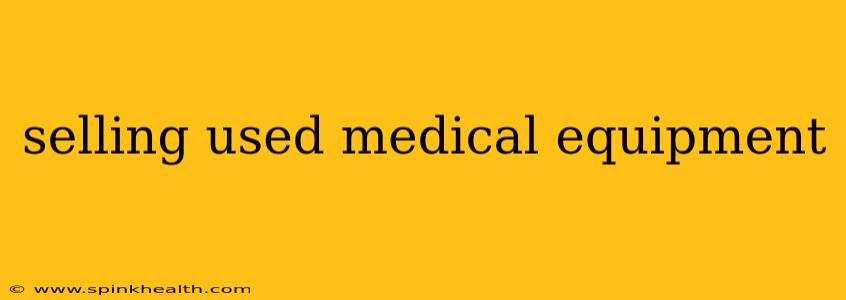The hum of a hospital, the whir of sophisticated machinery – the medical field is a world of cutting-edge technology. But what happens to that equipment when it's no longer needed? That's where the market for used medical equipment comes in. This isn't just about clearing out space; it's a dynamic industry offering significant cost savings and a sustainable approach to healthcare resource management. This guide delves into the intricacies of selling used medical equipment, helping you navigate this specialized market with confidence.
What Types of Used Medical Equipment are in Demand?
The demand for used medical equipment varies greatly depending on factors such as age, condition, and technological advancements. However, certain types of equipment consistently maintain a strong market presence. These often include diagnostic imaging systems (like ultrasound machines and X-ray units), surgical instruments, patient monitoring devices, and general-purpose clinical equipment. The key is understanding the specific needs of potential buyers – hospitals, clinics, research facilities, and even individual practitioners.
How Much is My Used Medical Equipment Worth?
Determining the value of your used medical equipment is a crucial step. Several factors influence this, including the equipment's age, condition (including functionality and cosmetic appearance), brand reputation, and technological advancements since its manufacturing. A thorough assessment, potentially involving a professional appraisal, is recommended for accurate valuation. Online marketplaces and industry-specific publications often provide pricing guides and historical sales data to aid in this process. Remember, transparency is key – accurately representing the equipment's condition is vital for building trust with potential buyers.
Where Can I Sell My Used Medical Equipment?
There are several avenues for selling your used medical equipment. Online marketplaces dedicated to medical equipment are a good starting point. These platforms often have a built-in audience of potential buyers, making it easier to reach a wider market. Auction sites can also be effective, particularly for specialized or high-value equipment. Direct sales to hospitals, clinics, or medical equipment dealers are another viable option, offering the potential for faster transactions but often requiring more effort in establishing connections.
What Documentation is Needed When Selling Used Medical Equipment?
Proper documentation is crucial when selling used medical equipment. This isn't just about paperwork; it's about transparency and legal compliance. You'll typically need to provide comprehensive details about the equipment, including the make, model, serial number, purchase date, maintenance history, and any known defects. Depending on your location and the type of equipment, you may also need to provide certification of service and calibration, as well as compliance with relevant safety and regulatory standards. Failing to provide complete and accurate documentation can lead to delays, disputes, and even legal issues.
What are the Legal and Regulatory Considerations?
Navigating the legal landscape of selling used medical equipment is crucial. Depending on your location, specific regulations may govern the sale and transfer of medical devices. Understanding these regulations – often involving safety certifications, labeling requirements, and compliance with relevant healthcare standards – is paramount. Consult legal counsel to ensure full compliance to avoid any legal complications.
How Can I Ensure a Smooth and Efficient Sale?
A smooth sale involves meticulous preparation and clear communication. Begin with a thorough cleaning and inspection of the equipment, taking high-quality photos and videos to showcase its condition accurately. Create a detailed description of the equipment's features, specifications, and any known issues. Communicate promptly and professionally with potential buyers, answering questions thoroughly and addressing concerns proactively. Negotiate fairly and ensure a clear agreement on payment terms and delivery arrangements. Finally, provide appropriate documentation to facilitate a smooth and transparent transaction.
This journey into the world of selling used medical equipment may seem complex, but with careful planning, accurate assessment, and adherence to legal and regulatory standards, it can be a rewarding experience, both financially and environmentally. Remember, transparency, accuracy, and clear communication are paramount to success.

